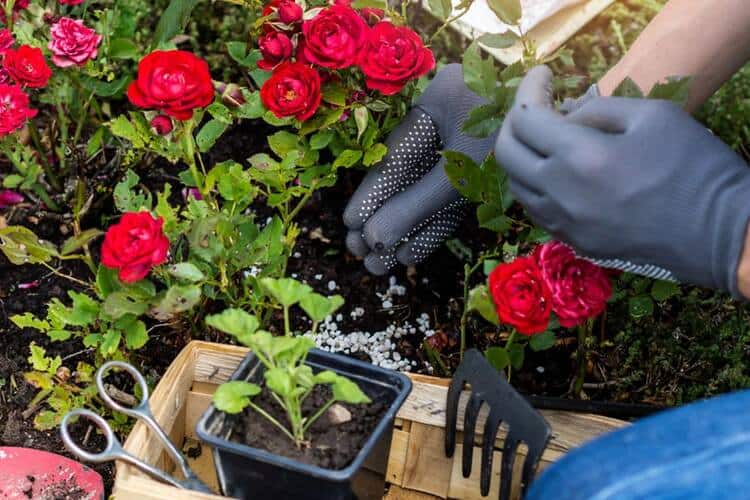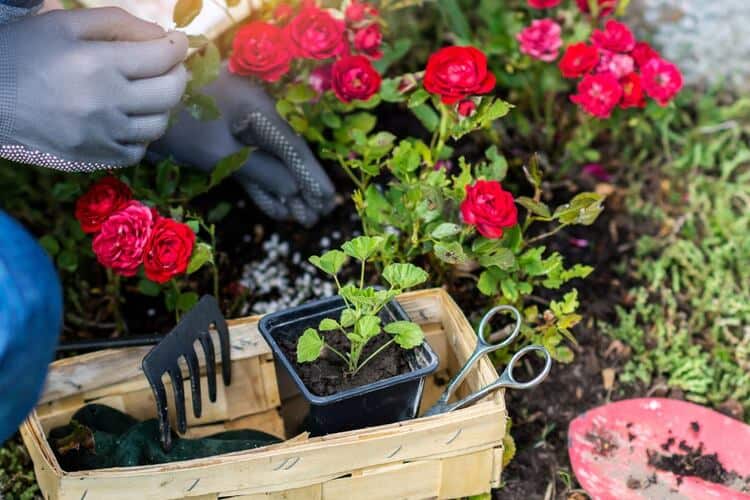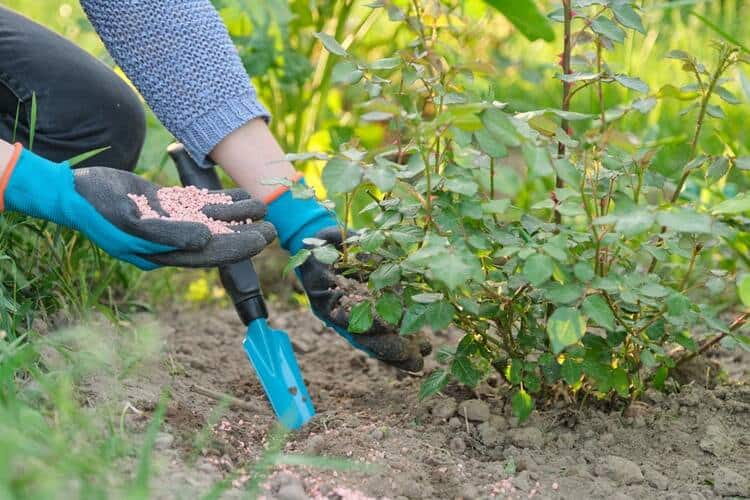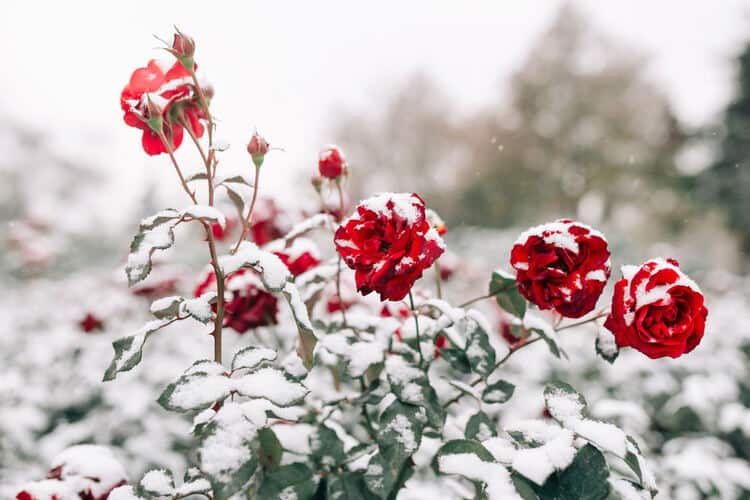Can Rose Fertilizer Be Used On Other Plants? Nutrient Secret

Some liquid fertilizers can be used together for many different plants. Yet others are only suitable for certain plants. So, can rose fertilizer be used on other plants? The answer is yes. Rose fertilizer can be used on other flowering plants as well. You can use it in combination with NPK, which will be good for other flowering plants. Let’s dive right into the details!
Can Rose Fertilizer Be Used On Other Plants?
Yes, rose fertilizer can be used on other plants due to its various nutrients.
Nitrogen in rose fertilizer is an acidifier and benefits palms, grass, acid-loving species, and citrus trees. The more nitrogen content in the compost, the more acidic it becomes. Palms, grass, acid-loving species in general, and citrus trees would all benefit from it. Since this element is water-soluble, it often leaches out of the soil before the plant can absorb it.
Hence, its rating is typically raised. The plants should be able to capture more of it before Nitrogen washes away at higher elevations. However, when it washes into ponds and other water-soluble environments, it promotes algal development. The presence of phosphorus in this liquid fertilizer is why it is favored by many blooming plants, as phosphorus promotes flowering. The fruit set is encouraged by higher potassium levels.
The difference between them lies in their guaranteed analytical ratings. The majority of plants will make use of anything you offer them. If you provide them with the wrong type, they are not going to fulfill your desire. Rose plant food is not as effective for acid-loving plants as it requires an acidic pH to absorb the nutrients. English roses, miniature roses, and hybrids can benefit from the same fertilizer. Annuals and perennials will benefit from this one, making it easier to care for various plant types. Miracle-Gro Rose Food is recommended for any plants in your garden.
Tips: Epsom salt is often praised as a natural way to kill bugs and grow new plants. However, science has not shown that Epsom salt benefits the plant, and applying Epsom salt can harm the plant.
What is fertilizer for roses made of?
Organic
Organic fertilizers are made from animal or plant materials that were once alive and are super friendly to the Earth. Cottonseed, blood, bone, alfalfa, superphosphate, fish emulsion, fish meals, and bone meal are the most regularly utilized ingredients. They’re gentle, safe, and help roses bloom their best. Rose food can be combined with other organic fertilizers, but make sure that the liquid fertilizer is specifically made for roses.
NPK
The term refers to a compost that contains a combination of Nitrogen, Phosphorus, and Potassium, although the amounts may vary. This composition is favorable for beautiful roses. These are the three main elements that all-natural products require, in varying quantities depending on the plant’s needs.
- Nitrogen (N): This helps the rose grow tall and have lots of green leaves. It’s like the vegetable on our dinner plate!
- Phosphorus (P): This nutrient makes sure roses have big, colorful flowers. Think of it as the sunshine for the plant.
- Potassium (K): This is like a shield. It helps roses stay strong and fight off diseases.
It contains 24% total nutritional content and 76% filler content. The NPK ratio of 6-12-6 is suitable for roses because it consistently offers the fundamental elements in quantities favorable to beautiful roses.
Macronutrients
Roses need calcium, magnesium, boron, sulfur, copper, zinc, and manganese for growth. You can consider macronutrients to be multivitamins. A precise combination of macronutrients and micronutrients is ideal for a specific plant species.
Rose Fertilizer vs. Regular Fertilizer: The Detailed Scoop
When we talk about fertilizers, it’s kind of like talking about food for plants. The differences between rose fertilizer and regular fertilizer and see if roses’ special food can be shared with other flowers.
Rose Fertilizer:
Roses are hungry plants! They need lots of nutrients, especially when they’re making those beautiful blooms. Rose fertilizers often have a higher amount of phosphorus (the middle number) because phosphorus helps with flower development.
Regular Fertilizer:
Regular or general-purpose fertilizers are designed to be a “one-size-fits-all” solution. They have a balanced amount of N-P-K to cater to the average needs of most plants.
Can We Use Rose Fertilizer on Other Flowers?
The answer is, often, yes! Here’s why:
- Safety: Rose fertilizer won’t “hurt” other plants. However, the key is to ensure you’re not over-fertilizing. Too much of any fertilizer can be harmful.
- Flowering Plants Love Phosphorus: Just like roses, many flowering plants will appreciate the extra phosphorus in rose fertilizer. It can help them produce more vibrant and larger blooms.
- Watch the Nitrogen: If a plant gets too much nitrogen, it might grow lots of leaves but fewer flowers. So, if you’re using rose fertilizer on other plants, keep an eye on how they respond.
While rose fertilizer is specially formulated for roses, it can be beneficial for other flowering plants too. Just remember, the key to happy plants is understanding their needs and adjusting care accordingly.
Can I use rose fertilizers on vegetables?
Rose fertilizer can be used on vegetables, but they may require additional nutrients in appropriate proportions. The NPK percentage of the RoseTone we just looked at is 4:3:2. However, certain rose plant fertilizers may have better NPK rates. Colorado State University recommends using at least one pound of 10:10:10 fertilizer and two pounds of 5:10:10 manure every 100 feet for vegetables.
According to their guidelines, you’ll need a large amount of liquid fertilizer to achieve this ratio. Therefore, you should avoid using rose plant food on veggies during their early development stages, as they require more nutrition for root growth.
It would be beneficial to fertilize your soils properly before seeding and during the early phases of growth. You may accomplish this procedure by adding organic fertilizer, compost, mulching to prevent weed development, and sufficiently watering plants.
You may add supplementary nutrients as a last resort, like this fertilizer, during the planting season once the flowers, rose plants, and vegetables have received adequate nutrients within the initial phases. Rose plant food is less effective for acid-loving plants, as they require an acidic pH to absorb the nutrients.
Plants That Might Say “No Thanks” to Rose Fertilizer
Let’s explore which plants might not be the best friends with rose fertilizer.
- Succulents and Cacti: These cool plants from the desert don’t like too much food. They’re used to growing in places with not a lot of nutrients. If we give them rose fertilizer, it might be too much for them!
- Orchids: These delicate and exotic beauties have very specific nutrient needs. Too much of anything, especially phosphorus, can throw them off balance.
- Herbs: Think of plants like basil, mint, or rosemary. They’re more about leaves and flavor than flowers. Rose fertilizer might not be their first choice because it focuses more on flower growth.
While roses and their special fertilizer are a match made in garden heaven, other plants might not be fans. While roses and their special fertilizer are a match made in garden heaven, other plants might not be fans.
Conclusion
Can you use rose food on other plants? Maybe this is the first time you’ve used fertilizer on a rose bush or rose garden for more flowers. After reading this article, we hope you can answer the question “Can rose fertilizer be used on other plants”. If this is your first visit to Swipe Garden, you can find more articles about high-level gardens or growing roses below.
Related posts:




